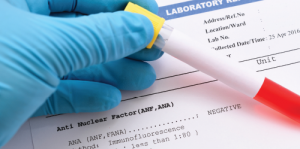
Jarun Ontakrai / shutterstock.com
The variability in serological testing for antinuclear antibodies (ANA) is under investigation after unexpected findings were reported from clinical trials of new agents to treat systemic lupus erythematosus (SLE).
In “Assay Variation in the Detection of Antinuclear Antibodies in the Sera of Patients with Established SLE,” David S. Pisetsky, MD, PhD, and his colleagues demonstrate variability in assays for identifying ANAs in patients with established SLE. First published online on March 27, 2018, in Annals of the Rheumatic Diseases, this study provides evidence that the performance characteristics of test kits can lead to assay variability.
The tests investigated included three immunofluorescence assays (IFA), an enzyme-linked immunosorbent assay (ELISA), and a bead-based multiplex assay. Study results may prompt some clinicians to consider how they interpret results of ANA assays and to adjust their testing protocols for patients with lupus.
The Research Rationale
“We had a very specific motivation for doing this study,” says lead author Dr. Pisetsky, professor of medicine and immunology at Duke University in Durham, N.C. “ANA testing has been around for a long time. The IFA for ANA determination has been identified as the so-called gold standard. But the reason to look in detail at the results from different ANA kits was the experience in clinical trials.”
One study in particular, a phase 2 trial of belimumab, failed to demonstrate statistically significant therapeutic effects of the drug in patients with established SLE. The unexpected results led the investigators to examine whether any subpopulations showed responses. The laboratory results they looked at included ANA determinations. Although ANA assays are believed to be positive in 95–99% of patients with lupus, surprisingly, they found 30% of the patients were serologically negative.
“The company went back, reanalyzed the data and saw efficacy in the people who were ANA positive,” Dr. Pisetsky explains. “In addition to ANA, anti-dsDNA [anti-double-stranded DNA] results were tested. When the company went forward in the phase 3 trial, it was for those patients who were ANA or anti-dsDNA positive. Other companies have followed this approach, and it’s not uncommon that they experience the same problem [with patients who have SLE demonstrating negative ANA results],” he says.
Because of the developments from the belimumab study and other clinical trials, “serological testing is being used as a companion diagnostic or theranostic biomarker although existing tests have not been validated for this purpose,” Dr. Pisetsky and colleagues wrote in their study. This nature of the enrollment criteria for clinical trials led them to investigate the variability of ANA test kits in patients with established SLE.
